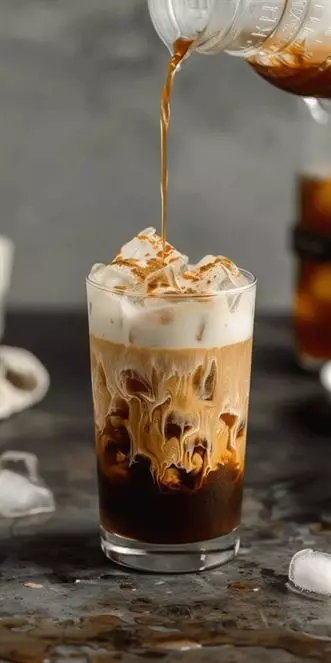Does the best Coffee Ice Cream Have Caffeine?
Table of Contents
Coffee Ice Cream Have Caffeine
Coffee ice cream, with its rich, creamy, and subtly bitter flavor, is beloved by many. But for those sensitive to caffeine or looking to indulge in a late-night dessert, the question often arises: does coffee ice cream contain caffeine? The answer is both simple and complex, as caffeine content can vary greatly depending on the brand, recipe, and even the individual serving size. In this exploration, we’ll dive into the details of caffeine in coffee ice cream, its variations, and some alternatives for those looking to avoid the jolt.
What is Coffee Ice Cream?
At its core, ice cream is a frozen dessert made from a base of cream, sugar, and flavorings derived from coffee. Like vanilla or chocolate, coffee ice cream has become a classic flavor, popular for its unique blend of sweetness and bitterness. Many coffee ice creams are crafted using brewed coffee, espresso powder, or coffee extract to achieve that distinctive coffee taste. This flavor addition often, but not always, introduces caffeine to the final product.
Does All Ice Cream Have Caffeine?
The short answer: Yes, most coffee ice creams do contain caffeine. However, the caffeine content can vary greatly from brand to brand. In general, ice creams made with real coffee or espresso powder will contain caffeine, while those made with artificial flavors might not.
- Standard – Many standard brands of coffee ice cream contain approximately 30 to 45 milligrams of caffeine per half-cup serving, which is about as much caffeine as a decaf cup of coffee. For most people, this is a small amount, unlikely to disrupt sleep or cause a noticeable caffeine buzz.
- Brands with Higher Caffeine Content – Certain specialty or premium coffee ice creams may contain significantly more caffeine. Some brands use cold brew coffee or espresso in their recipes, resulting in a caffeine level closer to that of a regular cup of coffee. For instance, a half-cup serving of some premium coffee ice creams can contain up to 70 milligrams or more of caffeine, which might affect those with caffeine sensitivity.
- Caffeine-Free Options – Some brands offer coffee-flavored ice cream that contains no caffeine at all, often achieved through the use of coffee flavoring rather than actual coffee or coffee extracts. These are ideal for those who crave the coffee flavor without the stimulation of caffeine.
Caffeine Content in Popular
Understanding the differences between brands can help make an informed choice when picking a coffee ice cream. Here’s a look at some of the common caffeine levels in popular brands:
- Ben & Jerry’s Coffee, Coffee BuzzBuzzBuzz – Known for its intense coffee flavor, Ben & Jerry’s version contains around 70 milligrams of caffeine per serving, on par with a weak cup of coffee.
- Haagen-Dazs Coffee Ice Cream – Haagen-Dazs coffee ice cream contains about 29 milligrams per half-cup, a moderate amount that’s similar to drinking a cup of decaf coffee.
- Talenti Cold Brew Sorbetto – This is a high-caffeine option, as it’s made using actual cold brew coffee, with about 45 to 60 milligrams per serving.
- Store Brands and Light Ice Creams – Many generic coffee ice creams at grocery stores contain around 20 to 30 milligrams of caffeine per serving, as they use coffee flavor rather than real brewed coffee.
Why Caffeine Levels Vary
Caffeine levels vary based on how the ice cream is flavored. For instance, using brewed coffee introduces less caffeine than espresso powder, and coffee flavoring may have none at all. Additionally, serving size matters; consuming a pint of coffee ice cream could contain caffeine equivalent to a strong cup of coffee!
How Much Caffeine Is Too Much?
While coffee ice cream contains a fraction of the caffeine found in a brewed cup of coffee, it can still add up for those sensitive to caffeine. According to the FDA, 400 milligrams of caffeine per day is considered safe for most adults, roughly equivalent to four or five 8-ounce cups of coffee. A serving or two of coffee ice cream is unlikely to exceed this limit, though sensitive individuals may still feel its effects.
For children, pregnant individuals, or those advised to limit caffeine, consuming coffee ice cream should be considered with caution. Even in small amounts, caffeine can disrupt sleep patterns and cause restlessness in sensitive people.
Decaf Is It Possible?
Just as decaf coffee offers an alternative for caffeine-sensitive drinkers, some brands have experimented with decaf coffee ice cream. While less common, certain specialty brands and stores offer decaf options to satisfy coffee lovers without the caffeine. Checking labels or asking in-store can often reveal if a decaf is available.
Enjoying Without the Caffeine
If you’re interested in the flavor of coffee without caffeine, there are some easy ways to enjoy it:
- Opt for Coffee Flavoring – Some brands achieve the taste of coffee through natural flavors rather than brewed coffee, meaning they offer a caffeine-free alternative.
- Try Coffee-Free Flavors – Flavors like mocha or tiramisu might contain the coffee flavor without the caffeine, depending on the brand.
- Homemade Coffee Ice Cream – If you enjoy making ice cream at home, you can control caffeine levels by using decaf coffee or coffee flavoring. This allows for all the coffee flavor with none of the buzz.
Final Thoughts
While coffee ice cream does contain caffeine, the levels are generally lower than a cup of coffee. For most people, a serving of coffee ice cream won’t cause the same stimulation as a regular cup of coffee. However, for those particularly sensitive to caffeine or looking to avoid it entirely, reading labels and understanding caffeine levels by brand can help.
In the end, remains a delicious treat that combines the best of coffee and dessert. Whether you prefer your coffee ice cream with a caffeine kick or without, there’s a version to suit every taste. So the next time you’re enjoying a scoop, you can rest assured knowing exactly what’s in that cup.

